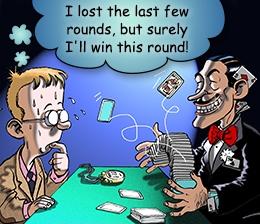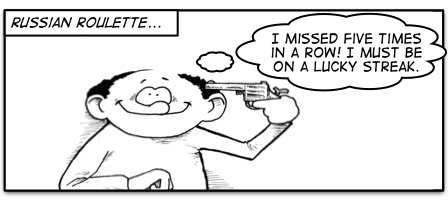
Fallacy (definition) – a deceptive, incorrect or misleading notion or opinion based on inaccurate facts or invalid reasoning.
Gambler’s fallacy
By far the most well known fallacy in the gambling world, it suggests that future events are less / more likely to happen based on the outcome of previous, independent events. If something occurs more frequently than normal for a period of time, chances are that it will occur less frequently than normal in the future.
In other words, in a 50-50 chance event, like the toss of a coin, the chances for one particular side to hit increase with each consecutive time the other side hits. The chances for a red number to come up in roulette increase exponentially with each black number that comes up in a row. This is simply not true, as the chances remain 50-50, independent of past events.
An argument most supporters of this fallacy make: Before 5 spins of the roulette wheel in the casino, the chances for all spins to be of the same colour are 3%. Therefore, if 4 blacks occur, chances for a 5th black remain 3% and you should keep betting red. They fail to understand that probabilities update with each passing event, that they have a dynamic nature.
I have known very smart people who believe in this theory and heard about smart people who were ruined by it. It`s probably just the way one`s brain is connected, but maths and stats have proven this to be a fallacy. While the theory is correct in … well, theory, it is false when it is used on events which hold a random factor or / and in short term. That`s the entire trick which fools many gamblers.
Albeit less applicable in the sports betting world and more in the casinos, it does find it’s place in betting as well, being associated with systems like Martingale. The deception is so high with this one, that many people will still argue their case even when presented with the mathematical facts.
The most famous example of the gambler’s fallacy occurred at the Monte Carlo Casino on August 18, 1913 when the roulette ball fell on black 26 times in a row. This was an extremely uncommon occurrence, although no more or less common than any of the other 67,108,863 sequences of 26 red or black. Gamblers lost millions of francs betting against black, reasoning incorrectly that the streak was causing an “imbalance” in the randomness of the wheel, and that it had to be followed by a long streak of red. (wikipedia)

Reverse gambler’s fallacy
Based on the same core principles, it is the complete opposite of “Gambler’s fallacy”. It suggests “riding with the wind” and betting on an event that occurs more frequently than normal, with the assumption that it will continue to occur.
While this is based on the same assumptions and is also a false theory, it is actually more successful than the “Gambler’s fallacy”. The reasons are that you might indeed luck out on a tilted roulette wheel, or you might correctly estimate the form of a football team or a tennis player, concrete facts, as opposed to simply betting on incorrect mathematical probabilities.
Nevertheless, it is still a fallacy that must be avoided, especially as studies have shown it`s more difficult psychologically to give up / change your choice in “Reverse Gambler’s fallacy” than in “Gambler’s fallacy” – that’s because in the case of this particular fallacy, you saw your choice winning multiple times, making a “Win” more palpable.
 Betdistrict.com
Betdistrict.com

